建筑环境与能源应用工程专业英语10教学文案
- 格式:ppt
- 大小:779.00 KB
- 文档页数:27

建筑环境与能源应用工程专业英语一、引言随着全球化的加速推进,英语已成为国际交流的通用语言。
在建筑环境与能源应用工程专业领域,掌握专业英语对于学生的学术研究和职业发展具有重要意义。
本文将从专业背景、核心词汇、行业现状、发展趋势以及如何提高专业英语能力等方面进行论述,以期帮助大家更好地认识和专业英语在这个领域的重要性。
二、专业英语核心词汇与概念1.建筑环境:指建筑内部和周边的空气、水、光线等环境因素,对人们的舒适度和健康生活具有重要影响。
2.能源应用:指在建筑环境中,通过科学合理的技术手段,有效地利用能源,降低能源消耗,实现可持续发展。
3.暖通空调系统:是建筑环境与能源应用工程专业的重要研究领域,涉及供暖、通风、空气调节等方面。
4.绿色建筑:是指在建筑设计、施工和运营过程中,充分考虑生态环境、节能与可持续发展等因素,实现人与自然和谐共处的建筑。
5.节能技术:是通过采用先进的建筑设计、建筑材料、可再生能源等手段,降低建筑能源消耗,提高能源利用效率的技术。
三、行业现状与趋势1.我国建筑节能政策:近年来,我国政府高度重视建筑节能工作,出台了一系列政策措施,如绿色建筑评价标准、建筑能效标识等,旨在推动建筑行业向绿色、低碳、节能方向发展。
2.行业发展态势:在全球范围内,建筑环境与能源应用工程专业正逐渐成为一个热门领域。
在我国,随着节能减排政策的深入推进,行业前景也十分广阔。
3.国际合作与交流:为了促进专业领域的发展,我国与国际上的交流与合作日益密切,如签订双边协议、举办国际会议等。
掌握专业英语,有助于学生和工程师参与国际合作项目,拓宽视野。
四、如何提高专业英语能力1.学习策略:制定合理的学习计划,坚持每天学习一定时间的专业英语,注重词汇积累和阅读训练。
2.实践与应用:通过参加学术会议、撰写英文学术论文、与国外同行交流等实践活动,提高专业英语的实际应用能力。
3.拓展阅读:阅读国内外权威期刊、研究报告等,了解行业动态,提升专业素养。
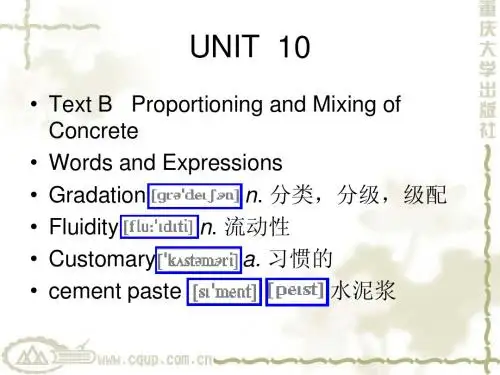
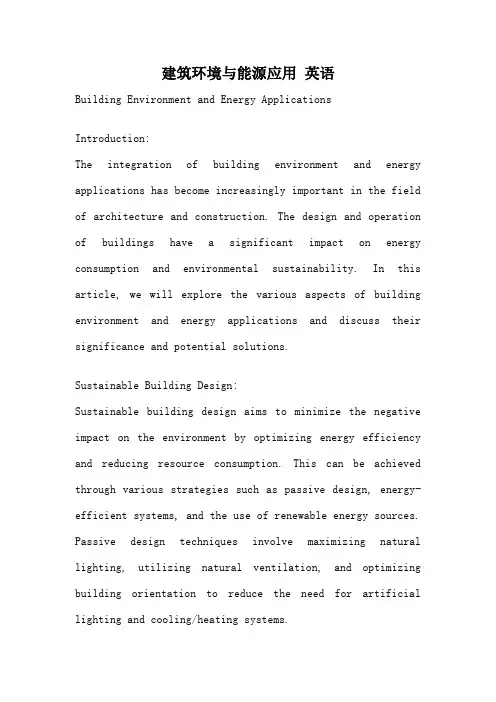
建筑环境与能源应用英语Building Environment and Energy ApplicationsIntroduction:The integration of building environment and energy applications has become increasingly important in the field of architecture and construction. The design and operation of buildings have a significant impact on energy consumption and environmental sustainability. In this article, we will explore the various aspects of building environment and energy applications and discuss their significance and potential solutions.Sustainable Building Design:Sustainable building design aims to minimize the negative impact on the environment by optimizing energy efficiency and reducing resource consumption. This can be achieved through various strategies such as passive design, energy-efficient systems, and the use of renewable energy sources. Passive design techniques involve maximizing natural lighting, utilizing natural ventilation, and optimizing building orientation to reduce the need for artificial lighting and cooling/heating systems.Energy-Efficient Systems:Energy-efficient systems play a crucial role in reducing energy consumption in buildings. These systems include lighting, heating, ventilation, and air conditioning (HVAC) systems. The use of energy-efficient lighting fixtures, such as LED bulbs, can significantly reduce electricity consumption. HVAC systems can be optimized by using programmable thermostats, efficient equipment, and regular maintenance to ensure optimal performance. Additionally, advanced building automation systems can help monitor and control energy usage, further enhancing energy efficiency. Renewable Energy Integration:Integrating renewable energy sources into buildings is a key aspect of sustainable design. Solar panels can be installed on rooftops to harness solar energy, which can be used to power various building operations. Wind turbines can also be installed in suitable locations to generate electricity. By utilizing renewable energy sources, buildings can reduce reliance on fossil fuels and contribute to a greener and more sustainable future.Smart Grid and Energy Management:The implementation of a smart grid system can greatly enhance the energy management of buildings. Smart grids enable real-time monitoring and control of energy consumption, allowing for efficient energy distribution and load balancing. This technology can help optimize energy usage, reduce peak demand, and enable better integration of renewable energy sources. Additionally, energy management systems can provide valuable insights into building energy performance, enabling proactive measures to improve efficiency and reduce costs.Green Building Certifications:Green building certifications, such as LEED (Leadership in Energy and Environmental Design), provide a standardized framework for evaluating and recognizing sustainable building practices. These certifications assess various aspects of building design and operation, including energy efficiency, water conservation, indoor air quality, and the use of environmentally friendly materials. Achieving green building certifications not only demonstrates a commitment to sustainability but also enhances the market value and desirability of the building.Conclusion:Building environment and energy applications are essential for creating sustainable and energy-efficient buildings. By incorporating sustainable design principles, energy-efficient systems, renewable energy integration, smart grid technology, and seeking green building certifications, we can significantly reduce the environmental impact of buildings and promote a more sustainable future. It is crucial for architects, engineers, and policymakers to collaborate and prioritize these applications to ensure a greener and more energy-efficient built environment.。
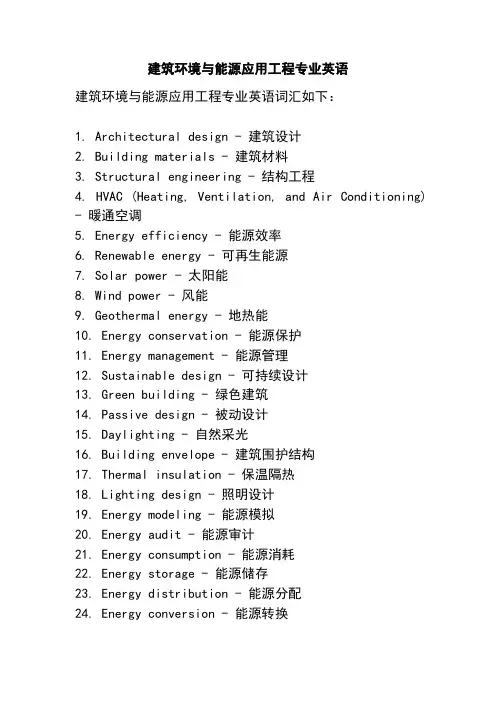
建筑环境与能源应用工程专业英语建筑环境与能源应用工程专业英语词汇如下:1. Architectural design - 建筑设计2. Building materials - 建筑材料3. Structural engineering - 结构工程4. HVAC (Heating, Ventilation, and Air Conditioning) - 暖通空调5. Energy efficiency - 能源效率6. Renewable energy - 可再生能源7. Solar power - 太阳能8. Wind power - 风能9. Geothermal energy - 地热能10. Energy conservation - 能源保护11. Energy management - 能源管理12. Sustainable design - 可持续设计13. Green building - 绿色建筑14. Passive design - 被动设计15. Daylighting - 自然采光16. Building envelope - 建筑围护结构17. Thermal insulation - 保温隔热18. Lighting design - 照明设计19. Energy modeling - 能源模拟20. Energy audit - 能源审计21. Energy consumption - 能源消耗22. Energy storage - 能源储存23. Energy distribution - 能源分配24. Energy conversion - 能源转换25. Building automation - 建筑自动化26. Smart grid - 智能电网27. Energy-efficient appliances - 能效电器28. Building codes - 建筑规范29. Energy policy - 能源政策30. Energy performance - 能源性能。

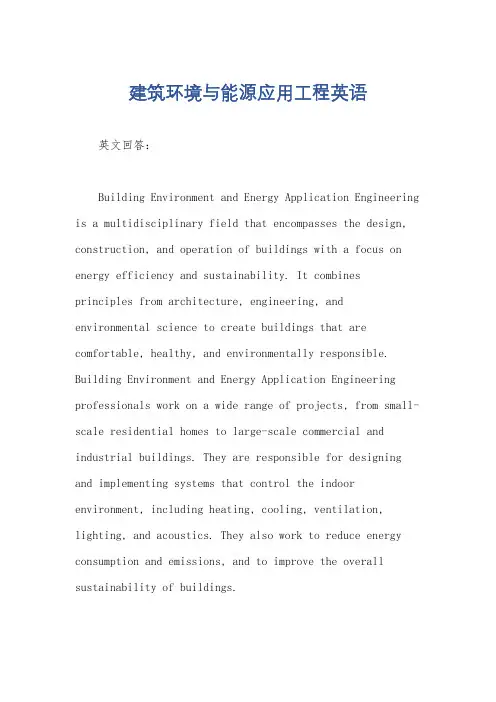
建筑环境与能源应用工程英语英文回答:Building Environment and Energy Application Engineering is a multidisciplinary field that encompasses the design, construction, and operation of buildings with a focus on energy efficiency and sustainability. It combinesprinciples from architecture, engineering, and environmental science to create buildings that are comfortable, healthy, and environmentally responsible. Building Environment and Energy Application Engineering professionals work on a wide range of projects, from small-scale residential homes to large-scale commercial and industrial buildings. They are responsible for designing and implementing systems that control the indoor environment, including heating, cooling, ventilation, lighting, and acoustics. They also work to reduce energy consumption and emissions, and to improve the overall sustainability of buildings.Building Environment and Energy Application Engineering is a growing field due to the increasing demand for energy-efficient and sustainable buildings. Building professionals who are trained in this field are in high demand, and they have the opportunity to work on a wide range of projects that make a real difference in the world.Here are some of the key challenges facing Building Environment and Energy Application Engineers:Designing buildings that are energy-efficient and sustainable.Reducing energy consumption and emissions.Improving occupant comfort and health.Creating buildings that are resilient to climate change.Developing new technologies and materials for building construction.Building Environment and Energy Application Engineers are working to meet these challenges by developing new and innovative solutions. They are also working to educate building professionals about the importance of energy efficiency and sustainability.中文回答:建筑环境与能源应用工程是一个多学科领域,涵盖了建筑物的规划、建造和运行,重点是能源效率和可持续性。
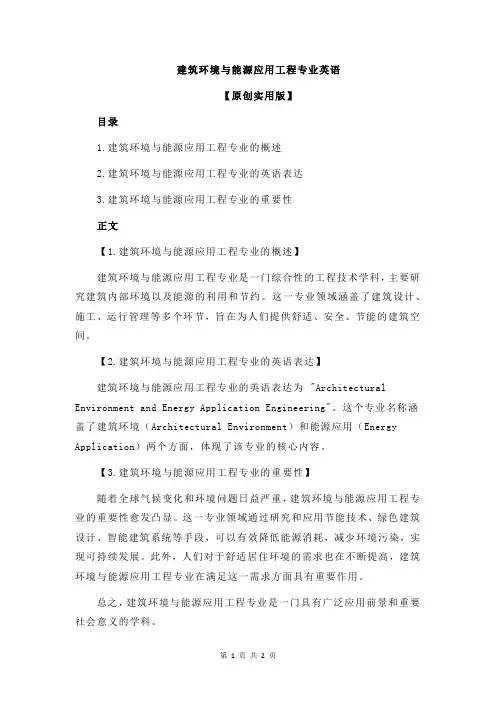
建筑环境与能源应用工程专业英语
【原创实用版】
目录
1.建筑环境与能源应用工程专业的概述
2.建筑环境与能源应用工程专业的英语表达
3.建筑环境与能源应用工程专业的重要性
正文
【1.建筑环境与能源应用工程专业的概述】
建筑环境与能源应用工程专业是一门综合性的工程技术学科,主要研究建筑内部环境以及能源的利用和节约。
这一专业领域涵盖了建筑设计、施工、运行管理等多个环节,旨在为人们提供舒适、安全、节能的建筑空间。
【2.建筑环境与能源应用工程专业的英语表达】
建筑环境与能源应用工程专业的英语表达为 "Architectural Environment and Energy Application Engineering"。
这个专业名称涵盖了建筑环境(Architectural Environment)和能源应用(Energy Application)两个方面,体现了该专业的核心内容。
【3.建筑环境与能源应用工程专业的重要性】
随着全球气候变化和环境问题日益严重,建筑环境与能源应用工程专业的重要性愈发凸显。
这一专业领域通过研究和应用节能技术、绿色建筑设计、智能建筑系统等手段,可以有效降低能源消耗,减少环境污染,实现可持续发展。
此外,人们对于舒适居住环境的需求也在不断提高,建筑环境与能源应用工程专业在满足这一需求方面具有重要作用。
总之,建筑环境与能源应用工程专业是一门具有广泛应用前景和重要社会意义的学科。
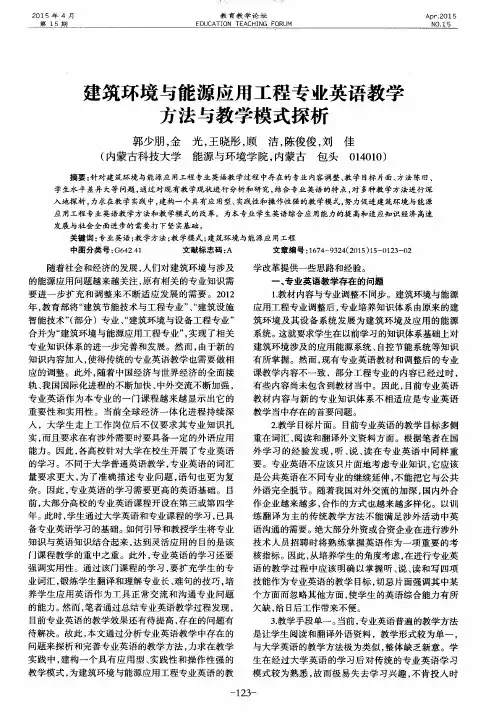

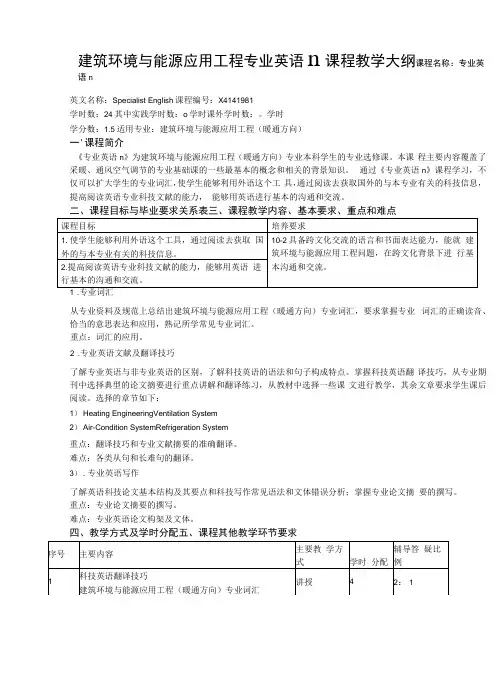
建筑环境与能源应用工程专业英语n课程教学大纲课程名称:专业英语n英文名称:Specialist English课程编号:X4141981学时数:24其中实践学时数:o学时课外学时数:。
学时学分数:1.5适用专业:建筑环境与能源应用工程(暖通方向)一'课程简介《专业英语n》为建筑环境与能源应用工程(暖通方向)专业本科学生的专业选修课。
本课程主要内容覆盖了采暖、通风空气调节的专业基础课的一些最基本的概念和相关的背景知识。
通过《专业英语n》课程学习,不仅可以扩大学生的专业词汇,使学生能够利用外语这个工具,通过阅读去获取国外的与本专业有关的科技信息,提高阅读英语专业科技文献的能力,能够用英语进行基本的沟通和交流。
二、课程目标与毕业要求关系表三、课程教学内容、基本要求、重点和难点1 .专业词汇从专业资料及规范上总结出建筑环境与能源应用工程(暖通方向)专业词汇,要求掌握专业词汇的正确读音、恰当的意思表达和应用,熟记所学常见专业词汇。
重点:词汇的应用。
2 .专业英语文献及翻译技巧了解专业英语与非专业英语的区别,了解科技英语的语法和句子构成特点。
掌握科技英语翻译技巧,从专业期刊中选择典型的论文摘要进行重点讲解和翻译练习,从教材中选择一些课文进行教学,其余文章要求学生课后阅读。
选择的章节如下:1) Heating EngineeringVentilation System2) Air-Condition SystemRefrigeration System重点:翻译技巧和专业文献摘要的准确翻译。
难点:各类从句和长难句的翻译。
3).专业英语写作了解英语科技论文基本结构及其要点和科技写作常见语法和文体错误分析;掌握专业论文摘要的撰写。
重点:专业论文摘要的撰写。
难点:专业英语论文构架及文体。
四、教学方式及学时分配五、课程其他教学环节要求作业要求完成授课教师布置的课后作业,课外阅读。
通过作业,巩固已学知识,进一步加深对所学内 容的理解,提高专业英语的听、说、读、写、译的能力并拓宽学生的知识面。
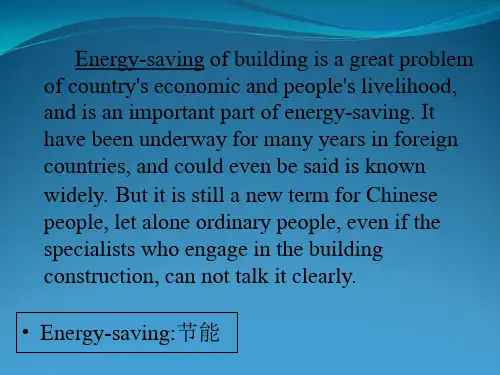
专业英语(环境工程)教案Unit 1 The Population Explosion要求:1、了解人口爆炸是当今世界面临的一个重要问题,以及导致人口爆炸的原因。
2、了解人口爆炸所带来的问题以及应对方法。
I. Some words and expressions1. population explosion 人口爆炸2. birth rates and death rate 出生率合死亡率3. food, clothing and shelter 衣食住行4.family planning 计划生育5.More than two-thirds of the people in the world live in the countries thathave programs for family planning.世界三分之二以上人口的国家都实行计划生育政策。
II. Questions1. Point out the reasons that cause population explosion.a. The number of births is greater than before.b. People can live longer.2. Today our population is six billion. How many years willit take to reach eight billion if the world populationincreased at a rate of eighty million?A. 2.5 yearB. 25yC. 250yThe answer is B. Why?3. How many measures can be taken to solve the problems thatare caused by large population gathering in big cities?a. Lower birth rate_______family planb. Improve food supplyc. Limit the size of cities and encourage people to live insmall towns and in the countryside.Unit 2 Effects of Noise教学要求:1、了解噪声的特点及来源。